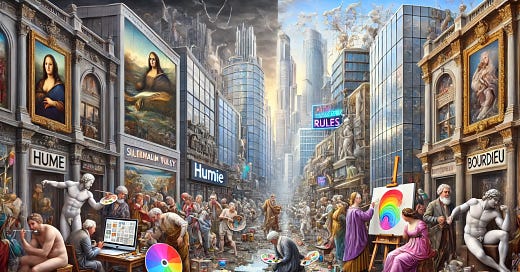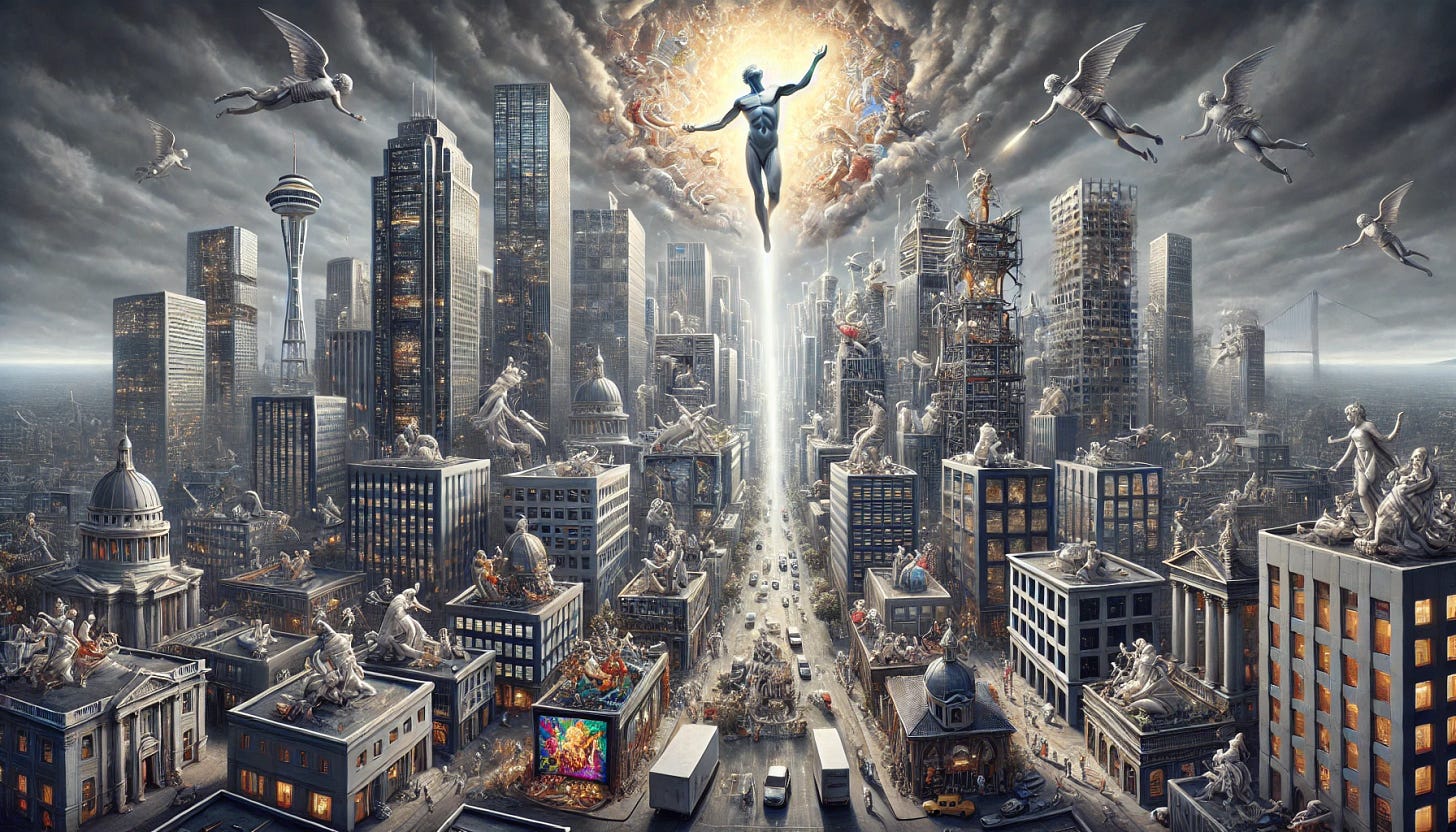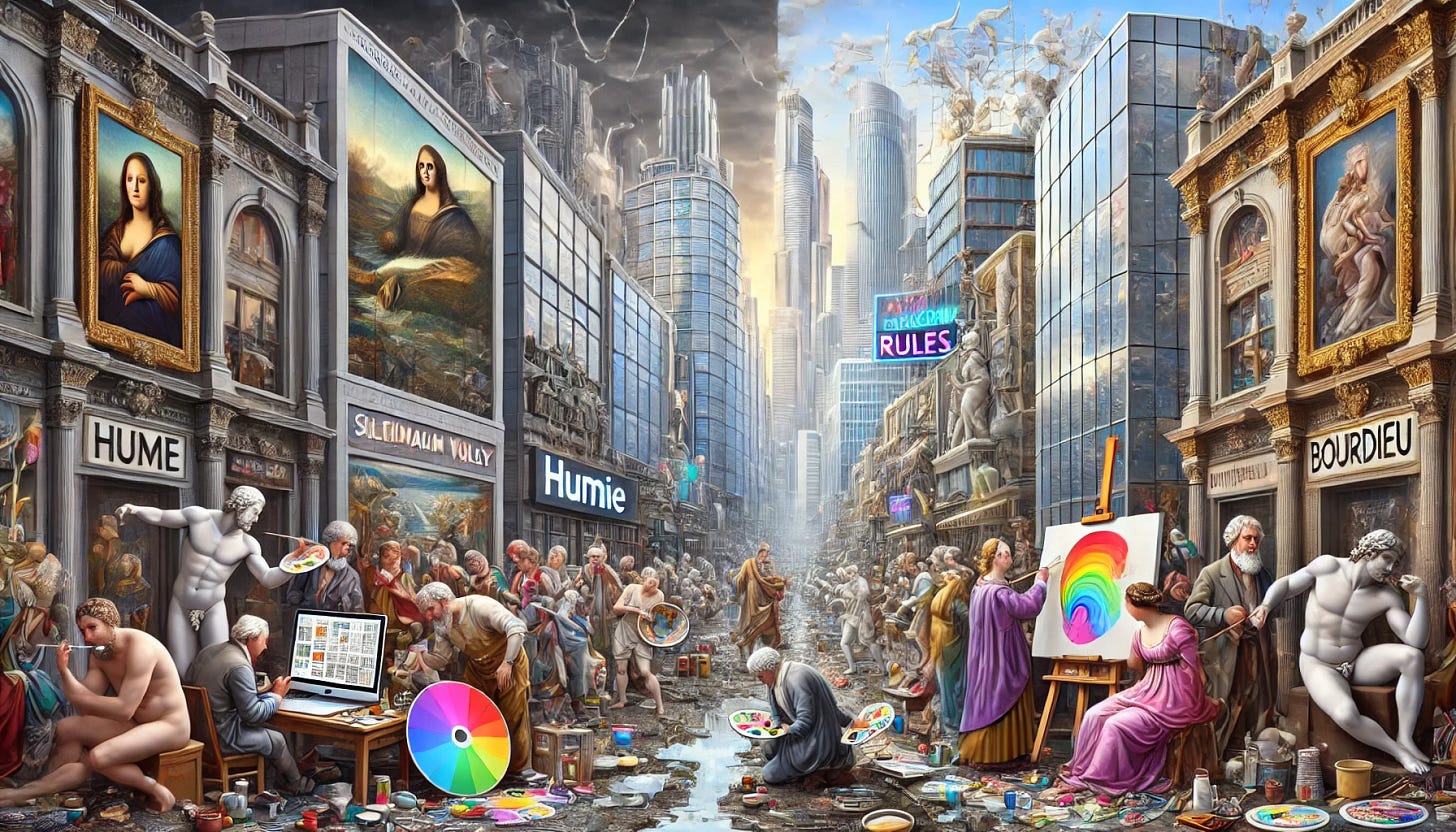One of the interesting takeaways from the recent discourse on Taste was the paltry explanations of how exactly to acquire it. While many tech types were quick to indulge in their own definitions of Taste, and dissect its practical application, there were scant details of the roadmap to reach the top of Taste’s pyramid. Nonetheless, ‘cultivate Taste’ became a succinct instruction—a pedestrian optimisation problem, a static mode to be attained overnight, as simple as making an online purchase.
The mimetic urge to simply ‘acquire Taste’ reveals why it does not come naturally to many. It’s oxymoronic. The Taste discourse fixated on its aesthetic symptoms—minimalist interfaces, inane curation, vibes-over-craft—but neglected its root cause: epistemic laziness. True Taste is a function of epistemological labour—a scalpel wielded against the standardised carcass of culture—while Silicon Valley’s cult of simplicity conflates algorithmic mimicry for discernment, entombing art in the sterility of ‘vibes’ and entrenching the West’s cultural recession.
The desire for Taste is for good reason. There are many totems of our cultural decline that warrant the urge to cut through the mire. We live in an era of aesthetic flattening. Cultural terrain once jagged with distinction now blurs into gradients of sameness, smoothed by the lazy consensus of ‘good Taste.’ The altar of homogeneity reigns, ensuring predetermined notions of ‘Goodness’ pervade culture of all creeds. We have created an impression economy, where we keep score with new metrics divorced from the authenticity and quality of the art itself.
What gives aesthetics meaning, beyond vapid pattern matching? It’s a question that has been prosecuted by a litany of thinkers much more esteemed than myself, and one I will not answer to any satisfactory degree in this piece. But some sociological probing in the context of today’s cultural malaise does reveal an interesting dichotomy: between what we deem as Taste, and what we deem as snobbery.
At first glance, this distinction seems arbitrary. But arbitrariness would surely imply a lot more noise in culture markets. In trend culture today, the crowd is not just wise, but the wisdom is omnipresent and automatic. We thoughtlessly label things as ‘Taste’ when the vehicle is merely sensory input, usually unsolicited. In trickier domains, we tend to conveniently lean on social proof as a curation guardrail. But cultivation in the most enduring and prestigious mediums, like literature and fine arts, is often ostracised as practice of the pretentious Elite.
The veneer between ‘Taste’ and posturing is wafer-thin. The true demarcation lies in epistemological rigour: the mental labour required to understand why something is deemed valuable. When Taste is reduced to sensory serendipity (a dish, a garment, a melody)—we anoint things as ‘Good’ a priori, mistaking instinct for insight. Raise the bar ever so slightly and demand proof of effort, and suddenly Taste curdles into posturing.
This is the paradox of our cultural stagnation: the more we fetishise simplicity, the more we reveal our aesthetic bankruptcy.
A priori Goodness and the race to the bottom
Consider cuisine. A Michelin-starred chef is appropriately lauded as ‘genius,’ but how many diners could articulate the chemical ballet of emulsification, or the agrarian ethos behind heirloom grains? We default to Kantian a priori judgements—declaring things universally beautiful before a posteriori considerations of their creation. The same applies to fashion’s arbiters, who praise a silhouette’s ‘timelessness’ while ignoring centuries of socio-political mores that shaped it. Drake1 can fill stadiums worldwide with adoring fans who liturgically recite his lyrics, while completely oblivious to the complexity of the rhyme schemes that govern them. The audience’s love is real, but it’s a love untethered from the craft’s scaffolding. It echoes Walter Benjamin’s lament in ‘The Work of Art in the Age of Mechanical Reproduction’: the ‘aura’ of art dims when divorced from its making. The artisan’s labour—such as the rapper’s syllabic calculus, or the chef’s molecular gastronomy—becomes invisible, reducing genius to mere vibes.
Taste, when divorced from effort, becomes a cargo cult—we mimic the trappings of sophistication without the labour that gives them meaning.
This is where the tech elite’s obsession with ‘simplicity’ hardens into dogma. Dieter Rams’ biblical aphorism—‘less, but better’—has mutated into a tyrannical doctrine. Less is always more is constitutional. But simplicity, when axiomatic, is evangelical kitsch—a commodity for the amasser rather than an asset for the curator. It confuses refinement with reduction, erasing the artisan’s fingerprints in favour of sterile minimalism2. What results in Silicon Valley is a world of apps that ‘just work’ but never sing, interfaces so frictionless they feel ghostly, and gaudy facades helplessly overcompensating for the lack of meaning behind them.
To me, that qualifies as posturing much more than an arbitrary pre-requisite level of sophistication that the median consumer deems as too complex.
Simplicity is a style preference
There are perfectly reasonable explanations as to why Silicon Valley defaults to simplicity. Efficiency makes sense in the workplace. Where the tension arises is when tech—an economic domain—bleeds into culture.
The conflation of efficiency with aesthetic merit betrays a deeper pathology in our cultural moment: the hegemonic creep of Silicon Valley’s utilitarian ethos into domains once sacrosanct from the rule of function. Where professional spheres once maintained a prudent separation from cultural spaces, today’s Taste discourse emanates primarily from tech’s professional class—architects of efficiency who mistake optimisation for Good style. When the economic and cultural domains were separate, it was not important that Michelangelo’s frescoes were easy to understand—they didn’t have a functional purpose beyond their aesthetic value. Now Taste discourse emanates from a professional domain which blurs functionality and aesthetic pleasure for its own sake.
This technocratic colonisation of cultural space has resulted in a rhetorical framework where the vernacular of product management (‘frictionless,’ ‘user-friendly,’ ‘scalable’) has become the default lexicon for discussing culture itself. The rub lies not in efficiency’s role within its native professional context, where clarity and functionality rightfully reside, but in its metastasis into cultural domains where opacity and complexity once served as fertile soil for aesthetic meaning.
To enshrine Simplicity = Good as gospel and not just a style preference is zealotry, which is why proponents of this argument sound fanatical. The Helveticacels have inverted the complexity status game. Our digital milieu has been hijacked by midwits enforcing homogeneity of expression in mediums that persist because of their aesthetic intricacy, not the lack thereof. We are inundated with a generation of hyperscalers who naturally baulk at qualitative complexity, and pathologise its exponents to compensate for their own shortcomings in their capacity to understand sophistication. Shrieks of ‘cringe’, ‘snob’, and ‘too extra!’ portray a terror of being unmasked as tourists in the realms they purport to curate. It is status anxiety masquerading as discernment.
Endless pabulum is the logical endpoint of a culture that venerates simplicity as a moral virtue—a world where the appearance of sophistication is mistaken for the real thing. High on their own supply of disruption, the self-proclaimed cultural arbiters fail to see that they’re not expanding the horizons of taste—they’re shrink-wrapping it.
The tech Taste discourse reveals the aesthetic bankruptcy of not only those shaping our Future, but the West in general. Our cultural famine is well documented, but our aversion to epistemological effort is not adequately recognised as its cause.
‘This is the way the world ends Not with a bang but a whimper.’
– T. S. Eliot, ‘The Hollow Men’
‘Quit Lorem Ipsum-maxxing’
– me, now
Artificial intelligence is syntactic, not epistemological
To think large language models (LLMs) replicate human epistemology conflates the map for the territory. They are not active philosophers but librarians of the already-said.
Silicon Valley’s current messiah, artificial intelligence, sits atop a paradoxical throne. It is both the saviour of scale and the executioner of nuance—a deity worshipped for its ability to democratise creativity while quietly eroding the very foundations of discernment. Technologists preach AI as the great equaliser—a tool to ‘democratise art’ and disrupt the elitism of cultural gatekeepers. Yet, so far in practice, generative AI has become the ultimate midwit—churning out formulaic LinkedIn thought-leadership slop with the cadence of a TED Talk, generating corporate art with the aesthetic depth of a hotel lobby, and reducing human ingenuity to a series of prompts engineered to avoid friction. What remains is a cultural landscape where Taste is dictated by statistical averages, and the sublime is flattened into the scalable.
This is the irony of AI’s aesthetic precarity. Tools like DALL-E and MidJourney, which promise to turn everyone into Rembrandt, too often produce outputs that feel like parodies of human ingenuity—surrealist clip art, in era limbo, trapped in the uncanny valley between novelty and déjà vu. Of course, it would be unwise to write off a vertical based on its earliest iterations. But we can judge methodology. LLMs are trained on the corpse of collective cultural memory, scraping the digital detritus of centuries and fashioning it into a lukewarm purée of median preferences. As we are repeatedly instructed to hail the AI revolution, we overlook the quiet violence of its standardisation—the way LLMs reward conformity, discourage friction, and replace the artisanal with the automated. In this paradigm, Taste is not a fruit of anthropological effort—it’s the outsourced delineations of a neural network’s best guess.
While LLMs can mirror the mechanics of epistemological methods to high standards of logical validity, they are yet to replicate the epistemology of human inference in culture markets. Masters of Socratic inquiry, they can perform syntactic deeds perfectly—but they lack semantic grounding. Acquiring taste is antithetical to LLMs because it requires irreducible elements of human epistemology. When ChatGPT generates a sonnet ‘in the style of Shakespeare,’ it doesn’t grapple with the existential weight of Macbeth or the hormonal frenzy of Romeo and Juliet. It apes patterns and arranges syntax from cosmic gulfs of context, but is blind to the human struggle that birthed it. Optimising for taste, through the use of LLMs, denies our capacity to cultivate new sensibilities—we are left merely to cater to old ones.
Taste is earned, not acquired
What the simplicity disciples fail to realise is that there is no such thing as capital-T Taste, by definition. True taste is not a static canon that can be bought off the shelf, but a dynamic excavation. It’s the difference between hanging a Basquiat in your living room for visual ‘pop’, and understanding the Afro-Caribbean semiotics in his crown motifs. Pierre Bourdieu called this cultural capital—the tacit knowledge accrued through immersion, not imitation.
David Hume prefigured this tension in his 1757 essay ‘Of the Standard of Taste’. He argues that while aesthetic judgement is inherently subjective, its refinement demands a ‘delicacy of imagination’ honed through exposure, debate, and repeated engagement with complexity.
The tension between the innate and the cultivated echoes Hume’s distinction between ‘natural’ and ‘artificial’ preferences. For Hume, ‘natural’ preferences are rooted in universals: the human hardwiring for rhythm in music, the satisfaction of narrative closure, or the primal allure of a fire’s glow. Natural preferences are based on features inherent to the art itself and are connected to fundamental human sentiments or experiences. They emerge from careful examination, and persist across cultural epochs. Today’s trends, and the velocity of their shelf lives, reflect what Hume described as ‘artificial’ preferences. They are socially malleable, temporally perishable, and are driven by status—thus governed by prejudices and asymmetry.
As Hume acknowledges that artificial preferences can produce authentic pleasure, and can harden into natural preferences over time, he argues not for the elevation of one over the other—but rather that an understanding of the relationship between the two is critical to making reliable aesthetic judgements—to having taste. Natural preferences form the bedrock of aesthetic judgement—while artificial preferences shaped by cultural conditioning and ‘practice’, are what elevates taste beyond primal instinct. Aesthetic legitimacy is thus not inherent to either category, but to the critic’s ability to articulate their interplay—a function of epistemological rigour.
The minimalist apostles in tech mistake their culturally conditioned love of clean lines (Swiss modernism’s legacy, not biology) for a ‘natural’ truth, deifying an artificial preference for sleekness. In contrast, layered and learned taste—like that for dissonant jazz or Baroque architecture—demands immersion in subcultural codes. In today’s world, taste is not the ability to keep your finger on the pulse of the rapidly evolving cycle of trends, but the ability to discern why exactly each one is or isn’t valuable. It is a delicate method of immersion and cultivation, not instant acquisition. To render taste as ‘subjective’ so reductively is to submit your agency in making aesthetic judgements—to seek refuge as a consumer haplessly docile to the clamouring machine of artificial preferences.
Today’s tech tastemakers should seek to emulate Hume’s ‘qualified judges’—those who cultivate discernment through sophisticated empiricism. For Hume, as for Bourdieu, taste is less about what you admire than how you’ve learned to see—a stark divorce from both the dogma of minimalism and AI’s synthetic veneer of polish. The practice of aesthetic judgements is the very space where idiosyncratic taste evolves.
Vestiges of this method persist in the discourse today, although muted. But Hume’s theory of aesthetic judgement is instructive. To mistake the accoutrements of taste (a Balenciaga coat, or a Le Corbusier chaise) for taste itself is to confuse a noun for a verb. Taste is artisanal, a function of exploration, not replication. The attributes of what makes taste valuable are the irreducible efforts it takes to acquire it in its most refined form, not the embellishments of taste themselves. You can’t buy flying hours.
To use a tasteless trope: taste is the journey, not the destination.
The banality curatorium
The cultural epoch of the last decade is defined by democratised curation. Every impression, playlist, mood board, and Substack newsletter is a tiny Louvre, a small monument of an individual's passive engagement in culture. Analogue tastemaking, by investigation and refinement, became secondary to the tyranny of algorithmic recommendation.
But curation without comprehension is aesthetic taxidermy. Curatorial culture in saturated content markets is banal, cheap to produce, and replicable. It’s simply not compelling.
Distinction by definition requires effort—it demands foraging in untamed intellectual hinterlands. Yet we prefer the convenience of algorithmic pastures, and in the process confuse familiarity for originality. Culture decays into a diaspora of tedium—a bell curve of mediocrity where creators are incentivised to cluster about the mean.
The incentive is clear for technologists: in the economy of AI abundance, taste is the new moat.
The New Enlightenment
Consider this piece as my call to arms to those willing to rebel against Raumplan functionality. And to borrow from Bourdieu, I believe that taste-based status in idea markets with low epistemological barriers is asymptotic since originality requires forays into idea markets with higher epistemological barriers. This principle will become more apparent as we accelerate towards our automated world of abundance, and those who flourish in more challenging idea markets will grow in value.
The great irony of this AI epoch is that these tools that promise limitless possibility actually deliver infinite sameness—the technology hailed as the ultimate democratiser of creativity is, in practice, the great homogeniser of taste. Instead of expanding the bounds of originality, we are accelerating our convergence to the mean, sculpted by self-reinforcement. This explains the emergence of taste and its newfound primacy amongst the tech elite—as the marginal cost of producing everything approaches zero, taste represents a reflexive attempt to snatch scarcity from the jaws of AI abundance.
There are many instances where imitation will suffice. But in this increasingly Gaussian-shaped world, the spoils will go to those willing to spelunk into the caves of epistemic effort. This isn’t a call for obscurantism, or elitist gatekeeping—but a plea to recognise that beauty, in its highest form, is earned, not inherited. The simplicity fundamentalists and posturing midwits can cling to their vanilla paradigms and delete adverbs at will. But culture, like wine, demands terroir: the grit, the grind, and the unglamorous labour of digging deeper. Taste is to immerse yourself into the grooves of the topography, not automate or outsource the process altogether.
You don’t need a PhD in linguistics to appreciate poetry, but you do need more than a Pinterest board to have taste. Elitist posturing is no different to simplify-maxxing when the observer cannot do justice to their artifact. Pretentiousness will continue to fatigue the masses. But the crux is not exclusivity—it’s effort.
Efficiency has its place, particularly in the confines of the tech enclaves responsible for accessible industrial design. There are good reasons for why this philosophy is seductive. But it is a philosophy wholly incompatible with developing taste. Taste is not acquired by moving fast and breaking things—but moving slow as to avoid breaking anything at all. To sanctify simplicity as the sole virtue across all mediums is to amputate nuance and lower our collective epistemic rigour. If it continues, we may soon forfeit any capacity to recognise true artisanship—sublimity in its various forms, the traits of its exponents, and the marginalia from which it originates from. After decades of Silicon Valley’s ruthless pursuit of optimisation, tomorrow’s victors will be those who do not evade the ethereal minutiae, but run towards them.
At its core, taste is a love letter to effort. Let’s stop sending postcards.
There are likely many more appropriate rappers to mention here, but I feel compelled to shoutout Drizzy after the heinous discourse about rhyming ‘tion’ with’ ‘tion’ that surfaced after the Fighting Irish freestyle
Some faint rebellion to tech’s chic minimalism can be found in last decade’s counterculture paradigm of lurid brand colours, garish industrial experimentation and truncated, ebullient copy. But this aesthetic expediency-as-a-service is equally meaningless.







I enjoyed the baroque, philosophical writing here - a style-reflects-content match. A sameness of crisp, concise, professional, or autoregressive writing has enveloped a lot of long-form content—in the same way software has converged to “interfaces so frictionless they feel ghostly.” Sometimes, heaviness is nice. It’s good to feel some weight, some depth, some difficulty. It’s refreshing to read a piece that’s unapologetically complex.
And this good style is also paired with a convincing, well-articulated thesis that challenges a prevailing dogma — chef’s kiss!! I think a core insight is that taste is hollow when it comes from conforming to some aesthetic standard without putting in the effort to understand it. Eg just copying the Linear or Stripe landing page design. Tech does have genuine insights about beauty - eg that function can make an object more beautiful, or that speed and simplicity can be part of the aesthetic appeal of software. But these principles have ossified into dogmas, and it is not taste to adopt them wholesale and apply them to everything thoughtlessly. Taste is about how you’ve learned to see. You can’t learn a way of seeing by just imitating.
At the same time, it was a bit fast-and-loose or hand-wavey with philosophical terms and at times they felt unnecessary or forced. Do you really think people are making Kantian a priori judgements when they believe a restaurant is good because it’s Michelin-starred? People taking Michelin stars at face value - or in other ways accepting dogmas of taste - are not engaging in anything Kant would call “a priori.” They’re not deriving a universal judgment purely from reason, independent of all experience. Rather, they’re relying on a social marker or brand authority. A priori is knowledge grounded in reason alone, but it’s used here as shorthand for unexamined assumptions. This takes a bit away from the essay for me.
A well-written piece on a difficult topic.
The epistemic laziness that devolves taste into fashion is the reason AI art is milquetoast. AI will deliver what you ask it for, and what you do not ask for, it considers unimportant and fills with an average of what it knows. Taste understands that everything is important and curates those details carefully.
It is a bitter pill when you understand that people do not know either what they like or want, but can easily tell you if they like something. What they like is often an iteration on what they have seen previously... mimicry.
I'd love to hear more about what you appreciate about Drake because I find him as lyrically expressive as 3 Lego blocks.